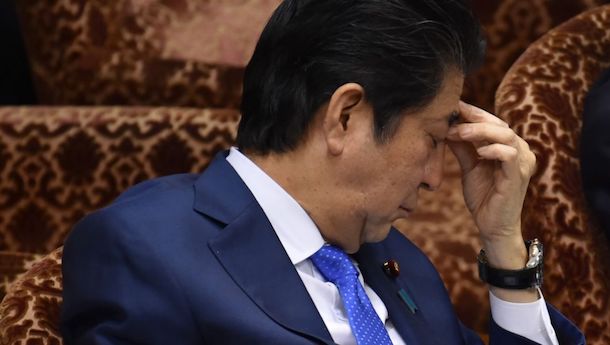In Japan, Prime Minister Shinzo Abe is in for a major test over the next couple of months. At the end of September, he'll be up for a third term as head of the ruling Liberal Democratic Party (LDP), and thus another term as prime minister. Led by Abe, the LDP pulled off a solid victory in October 2017 snap elections, scoring a supermajority and leaving the opposition marginalized and in disarray. But with members of his party in full control of whether he stays on, the outcome will be either the end of Abe's political career or the final step toward his becoming the country's longest-serving prime minister.
The Recent Political History of Japan
The Liberal Democratic Party has ruled Japan for much of the post-World War II period, holding power in the Diet for all but three of the past 63 years. (That brief period of rule under the now-defunct Democratic Party of Japan ended in 2012, when Abe took the reins of the LDP and led the party to victory.) Since then, there has been only one LDP presidential election, which Abe won in 2015. It was the first uncontested LDP presidential victory since 1997.
Since 1989, the average length of a prime minister's tenure has been under two years, and Abe's six-years-and-counting have broken the trend. In March 2017, Abe even managed to secure a change to party bylaws that allowed him to serve for a third term. But this will only happen if his party decides it wants him to.
Why Abe Might Go
Despite presiding over the LDP's victory in October, Abe is by no means guaranteed to retain power. Numerous scandals that began in 2017 have proved stubbornly persistent, flaring up again in recent months and bringing Abe's approval ratings to the lowest levels of his tenure.
On the foreign policy front, things are worse. The prime minister is struggling to keep Japan from becoming irrelevant in the North Korea negotiations, while also facing stubborn U.S. trade pressure in the form of tariffs as well as a stagnating outreach effort to Russia.
Since Japanese politics dictate that the ruling party votes on its next leader — who then becomes the nation's prime minister — in an internal election, the LDP has the fate of Abe in its hands. And party members will need to decide whether they want to retain their longtime leader and gamble that he can revive himself, or take the risk of moving in an entirely new leadership direction and invite a return to the trend of constantly rotating prime ministers that characterized the past three decades.
Why Abe Might Stay
But there are a number of reasons why the LDP may decide that retaining Abe through 2021 is worthwhile, even considering his recurrent scandals and low approval ratings.
Right now, Japan is working on countering China, returning its military to its normal status as a tool of foreign policy, reviving its stagnating economy and dealing with demographic decline. And Abe's uniquely long tenure has allowed him to make major strides in Japan's long-term goal of again being an active player in the Pacific, after a half-century of pacifist foreign policy. In 2015, Abe secured landmark security legislation that enabled Japanese troops to deploy overseas as peacekeepers and to participate in select support missions for U.S. activities in the Pacific. And under his rule, Japan has forged deeper links with Southeast Asian nations in the maritime balance against China. Tokyo even managed to complete the Comprehensive and Progressive Trans-Pacific Partnership (CPTPP), a multilateral trading bloc in part meant to shape or contain China's economic rise.
On the domestic front, completing this deal meant overcoming powerful political interest groups. Abe's other goals are to finally reform the article in Japan's Constitution that ensures a pacifist foreign policy, to make concrete strides in renormalizing the military and to involve Japan as the United States develops a network of alliances and security partnerships throughout the Indo-Pacific region. Losing Abe would put many of the items on the LDP's agenda in jeopardy.
A new prime minister would also threaten Japan's political stability at a time when its neighbors are set for years of relatively stable leadership. In China, President Xi Jinping recently secured an open-ended term in office, which will allow policy continuity both on the foreign and domestic fronts. In South Korea, President Moon Jae In will remain in office until 2022. Russian President Vladimir Putin recently won another term in office, which may or may not be his last but will leave him in power through 2024. And, of course, North Korean leader Kim Jong Un is set to remain in his post for as long as his regime endures. If the LDP removes Abe, Japan may not have a leader with Abe's staying power for some time, and it could easily return to the cycle of shuffling through less influential prime ministers every couple of years.
Finally, the main opposition parties are in disarray, still reeling from last year's losses and lacking any potential champion or unifying force. In fact, the persistence of Abe's scandals is in part a manifestation of opposition efforts to retain some leverage from their weak position, by calling witnesses to the Diet, boycotting votes and keeping the scandal in the public eye.
Facing the Factions
So although Abe's poll numbers overall have been low (his Cabinet disapproval rating was 50.3 percent in May), his political career still has legs. Among LDP members, 45.8 percent favor Abe. And the upcoming contest for the next LDP president/Japanese prime minister will be an internal affair, contingent on party power dynamics and members' individual calculations.
As of 2014, the LDP election involves a total of 810 votes among two groups of party stakeholders: LDP Diet members and members of local party chapters. The 405 Diet members each get one vote, and the results of the party chapter votes are distributed proportionally. If that process fails to secure a winner, lawmakers and the LDP's 47 prefectural chapters will decide on a victor in a second round of voting. (The last runoff was in 2012, when Abe nearly lost to former party Secretary-General Shigeru Ishiba but won in the second round.) This means that politicking among the LDP grassroots will be important, but securing the support of as many lawmakers as possible will be key.
When it comes to winning lawmaker support, it will be important for Abe and any potential competitor to court the LDP's official internal factions. For much of its history as a monolith in Japanese politics, the LDP ensured internal competition and connection to the grassroots by establishing several official factions that constituted a "party system within a party." Up until 1994, these factions doled out money to lawmakers for campaigns in a sort of patronage system and held strong influence over candidates. But since the passage of transparency laws and electoral reforms almost 25 years ago, the factions have played a much less essential role.

However, the factions will matter in terms of mobilizing the votes of lawmakers in support of a party president. The faction heads, should they choose to step up, also serve as potential candidates with built-in constituencies. The LDP is currently divided into seven factions made up of the LDP Diet members and party leadership. Abe himself heads his own faction. His Hosoda faction is the largest, with 94 members, followed by the Aso faction (59) and the Takeshita faction (55). For now, Abe appears to enjoy the backing of the Aso faction and of the fifth largest group, the Nikai. The third largest faction, led by Minister for Reconstruction Wataru Takeshita, has yet to commit to Abe.
The list of Abe's potential challengers is short, leaving faction leaders with few alternatives to rally behind. Although others may yet emerge, there are two main contenders, though neither is a strong bet to defeat Abe at the moment. The first is Shinjiro Koizumi, the LDP's chief deputy secretary-general and son of long-ruling Prime Minister Junichiro Koizumi. Koizumi is popular with the public, but at 36, he would risk a potentially long and fruitful political career if he ran too soon. The second major potential competitor is Ishiba, who almost bested Abe six years ago. Ishiba's faction, Suigetsu Kai, has 20 members, and while that's enough to earn him an endorsement to run in the election, it's not influential enough to sway other factions.
Ultimately, even with Abe's popularity in jeopardy, the ruling LDP still has many reasons to keep him in his post. The prime minister's sustained tenure has allowed for a degree of continuity in both domestic and foreign policy, more important than ever given the continued rise of China and the changing dynamics in Korea. With the opposition on its back foot, few internal ruling party challengers to Abe and elections far off, the party has more leeway to stick with Abe. However, with months still to go before the vote, it will still be important for Abe to focus on ways to increase his popularity and score some foreign policy wins.






